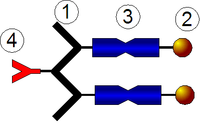
Photo from wikipedia
Monomers derived from glucose and galactose, which contain an endocyclic alkene (in the sugar ring) and a terminal alkyne, underwent a cascade polymerization to prepare new polymers with the ring-opened… Click to show full abstract
Monomers derived from glucose and galactose, which contain an endocyclic alkene (in the sugar ring) and a terminal alkyne, underwent a cascade polymerization to prepare new polymers with the ring-opened sugar incorporated into the polymer backbone. Polymerizations were well-controlled, as demonstrated by a linear increase in molecular weight with monomer-to-initiator ratio and generally narrow molecular weight dispersity values. The living nature of the polymerization was supported by the preparation of a block copolymer from two different sugar-based monomers. The resulting polymers were also fully degradable. They underwent fast and complete depolymerization to small molecules under acidic conditions.
Journal Title: Journal of the American Chemical Society
Year Published: 2019
Link to full text (if available)
Share on Social Media: Sign Up to like & get
recommendations!